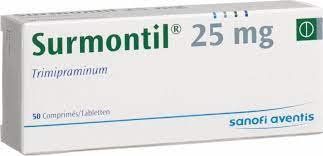This is an automatically translated article.
Quetiapine is commonly used in the treatment of some mental illnesses such as schizophrenia, bipolar disorder, etc. Like other drugs, you may experience unwanted effects when using it. this drug. What are the side effects of Quetiapine?
1. What does Quetiapine do?
Quetiapine belongs to the class of antipsychotic drugs, used to treat certain mental/mood conditions such as schizophrenia, bipolar disorder, or episodes of euphoria or depression associated with bipolar disorder.
Quetiapine works by helping to restore the balance of a certain natural substance in the brain. Quetiapine can reduce hallucinations and improve your ability to focus. Quetiapine helps you think more clearly and positively about yourself, feel less anxious, become more active in your daily life. Quetiapine may also improve mood, sleep, loss of appetite, and energy levels. Medications can help prevent serious psychological changes or reduce how often mood swings occur.
2. Indications and contraindications of Quetiapine
Quetiapine is indicated in the following cases:
Schizophrenia; Bipolar disorder; Moderate to severe manic episodes in bipolar disorder; Major depressive episode in bipolar disorder; Prevention of recurrence of manic or depressive episodes in patients with bipolar disorder who have responded to prior quetiapine treatment; Add-on treatment of major depressive episodes in patients with major depressive disorder. Contraindications of Quetiapine:
People with hypersensitivity to Quetiapine; Concurrent use of Cytochrome P450 3A4 inhibitors (such as HIV-protease, Erythromycin, Clarithromycin and Nefazodone); Azole antifungal.

Thuốc Quetiapine hoạt động bằng cách giúp khôi phục lại sự cân bằng của một chất tự nhiên nhất định trong não
3. Dosage and usage of Quetiapine
Treatment of schizophrenia and moderate to severe manic episodes in bipolar disorder:
Take medication at least 1 hour before meals; The starting dose of treatment is 300mg on the first day and 600mg on the second day; The recommended daily dose of Quetiapine is 600mg, which can be increased to 800mg per day; For maintenance treatment of schizophrenia, no dosage adjustment is required. Dose for the treatment of major depressive episodes in bipolar disorder:
Take the drug at bedtime; The first day of treatment is 50mg, the second day is 100mg, the third day is 200mg and the fourth day is 300mg; The recommended daily dose is 300mg; Doses > 300 mg/day should be initiated by physicians experienced in the treatment of bipolar disorder; If there is concern about tolerability of quetiapine, reduce the dose to at least 200 mg. Dose to prevent relapse in bipolar disorder:
Use the same dose as before, take it at bedtime, dose range from 300mg to 800mg/day. Dose for the treatment of major depressive episodes in MDD:
Take medication at bedtime; At the start of treatment use 50mg on days 1 and 2 and 150mg on days 3 and 4; The antidepressant effects of quetiapine were demonstrated at 150 mg and 300 mg/day as add-on therapy to amitriptyline, bupropion, duloxetine, escitalopram, citalopram, fluoxetine, paroxetine, sertraline and venlafaxine and at 50 mg/day if short-term monotherapy; So start with 50 mg/day. When necessary, the dose may be increased from 150 mg to 300 mg/day, based on individual patient assessment. When overdose of Quetiapine drug, patients will experience drowsiness, tachycardia, hypotension and anticholinergic effects, possibly prolongation of QT interval on electrocardiogram, convulsions, status epilepticus, rhabdomyolysis. , respiratory depression, urinary retention, confusion, delirium and/or agitation, coma, possibly even death.
There is no specific antidote for Quetiapine. The way to handle an overdose is to treat according to the symptoms that the patient experiences.
If you forget to take a dose of Quetiapine, take it as soon as you remember. However, if you remember that it is almost time for your next dose of Quetiapine, skip the missed dose and take your next dose at the scheduled time, never taking a double dose.

Thuốc Quetiapine được chỉ định trong các trường hợp bệnh tâm thần phân liệt
4. Quetiapine side effects
Common side effects of Quetiapine include:
Decreased hemoglobin; Increased serum triglyceride concentration; Increased total cholesterol (mainly LDL cholesterol); Reduce HDL cholesterol; Weight gain; Dizzy; Nausea; Headache ; Extrapyramidal symptoms ; Dry mouth is also one of the side effects of quetiapine. Less common side effects of Quetiapine include:
Neutropenia; Thrombocytopenia; Anemia ; Hypersensitivity including allergic skin reactions; Hypothyroidism ; Hyponatremia; Diabetes mellitus; Dysphagia; Increased serum aspartate aminotransferase (AST) levels; urinary retention; Sexual dysfunction; Causes exacerbations of pre-existing diabetes; Convulsions; Restless leg syndrome; tardive dyskinesia; Faint; QT prolongation, bradycardia. Rare side effects of Quetiapine include:
Agranulocytosis; Metabolic syndrome; Sleepwalking and related reactions such as sleep talking and eating disorders related to sleep; Venous thromboembolism; Neuroleptic malignant syndrome; Hypothermia ; Increased creatine phosphokinase in the blood; Pancreatitis; Bowel obstruction; Jaundice; Hepatitis ; breast swelling; Menstrual disorders. Side effects of undetermined frequency with Quetiapine include:
Toxin epidermal necrolysis; Erythema; Neonatal drug withdrawal syndrome. Not everyone experiences the side effects listed above from quetiapine. Other side effects not mentioned may occur. If you have any questions about side effects, consult your doctor or pharmacist.
Please dial HOTLINE for more information or register for an appointment HERE. Download MyVinmec app to make appointments faster and to manage your bookings easily.













